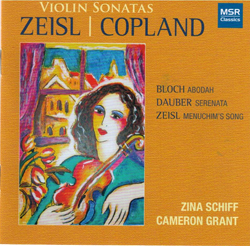
 SAN DIEGO — This week, in commemoration of Yom Hashoah, I have chosen to write about my sister Zina Schiff’s 2014 CD, Violin Sonatas: Zeisl, Copland, which also includes works by Bloch and Dauber.
SAN DIEGO — This week, in commemoration of Yom Hashoah, I have chosen to write about my sister Zina Schiff’s 2014 CD, Violin Sonatas: Zeisl, Copland, which also includes works by Bloch and Dauber.
All four Jewish composers represented on this recording lived during the Holocaust, and their lives were deeply affected by it.
Robert Dauber was living in Prague when, in 1942, the Nazis deported him to Terezin. There, he played cello for the many performances of the children’s opera, Brundibar. In 1944, the young musician was transported to Auschwitz, and from there, to Dachau, the notorious death camp, where Dauber perished.
The Serenata was composed the year the 20-year-old Robert was sent to Terezin. It reflects the light-heartedness of cabaret music, interspersed with a touch of Spanish Flamenco.
It is Dauber’s only remaining composition. The Classical Reviewer described Zina’s rendition of the Serenata as “exquisite playing.”
Eric Zeisl, a native of Vienna, and winner of the 1934 Austrian State Prize for composition, escaped with his wife to Paris the day after Kristallnacht. With the help of the French-Jewish composer, Darius Milhaud, Zeisl and his wife were able to sail to the United States, where they eventually settled in Hollywood. He found work as a low-paid, uncredited composer for MGM Studios. Between 1942 and 1958, he composed scores for over 20 films. Max Helfman, Director of Music at the Brandeis Camp Institute, invited Zeisl to be the Composer-In-Residence at the Institute. It was in 1951, when I was a camper at BCI, that Zeisl heard me play and presented me with an autographed copy of his violin piece, Menuchim’s Song, written in 1939.
Ten years ago, one of Hollywood’s foremost violinists, Israel Baker, concertmaster of the orchestras at Paramount Pictures, Columbia Records and Capitol Records, suggested to Zina that she perform and record the Zeisl Violin Sonata. Zina followed Baker’s suggestion, performing the work in live concerts and on this CD. MusicWeb-International calls the Zeisl Sonata, “ a powerful, thought-provoking work of Jewish character.”
When Zina told me about her plans to record the Zeisl Sonata, I found my copy of his Menuchim’s Song and gave it to her. She embraced it and used it as the opening piece on this award-winning CD. Fanfare Magazine described her performance: “Schiff declaims with impassioned intensity and searing tone.” Track 1
The third composer, Aaron Copland, was a first- generation American, whose parents had escaped the pogroms of Eastern Europe. Aaron was the youngest of their five children. In New York, the family belonged to a conservative synagogue, Baith Israel. Copland was called the Dean of American Composers.
The Violin Sonata was written in memory of Aaron’s dear friend, who was shot down over the Pacific in 1943. The last movement’s infectious joy seems inspired by Yiddish dance music. Track 4. The Classical Reviewer praised “the breathtaking playing in this fine performance.”
I remember Copland from my summer at the Berkshire Music Festival at Tanglewood, 1950. Our Festival Orchestra played several of his compositions, including Salon Mexico and Suite from Rodeo. A highlight of each week was his Sunday evening session with the student composers, whom he would critique with humor and kindness.
In later years, as a member of the San Diego Symphony, I played under his conducting and continued to appreciate his keen intellect and humble demeanor.
Ernest Bloch’s Abodah is an emotional work, inspired by the ancient service of the high priest on Yom Kippur. Bloch wrote it after hearing the 12-year-old Yehudi Menuhin perform. Bloch returned to his native Switzerland in 1930, only to come back to the United States, in 1939, when the Nazi influence was beginning to be felt across the border in neutral Switzerland. He spent the rest of his life in the United States.
This recording, which is available through Amazon and other outlets, was selected CD of the month by MusicWeb-International. Zina’s collaborating pianist is Cameron Grant, piano soloist with the New York City Ballet.
The recording’s content spans the gamut from sorrow to joyful hope for the future.
*
Eileen Wingard, a retired violinist with the San Diego Symphony, is a freelance writer specializing in coverage of the arts. She may be contacted via eileen.wingard@sdjewishworld.com